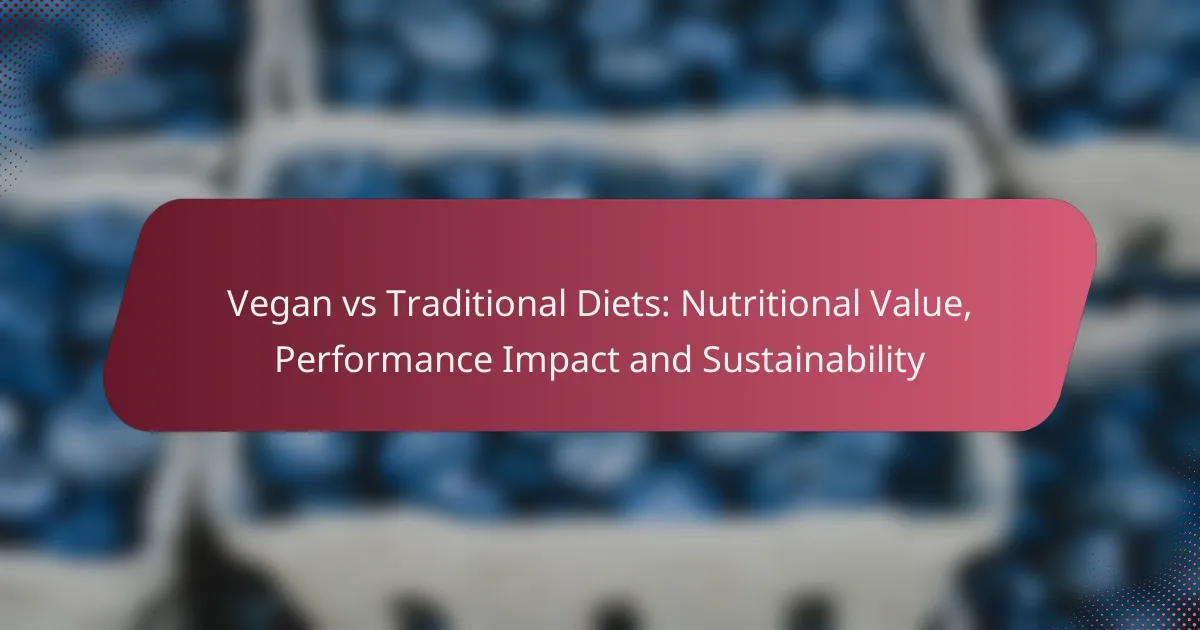The debate between vegan and traditional diets centers on their nutritional value, performance impact, and sustainability. Each diet presents unique benefits and challenges, influencing health outcomes and athletic performance while also affecting environmental sustainability. Understanding these differences is crucial for making informed dietary choices that align with personal health goals and ecological considerations.
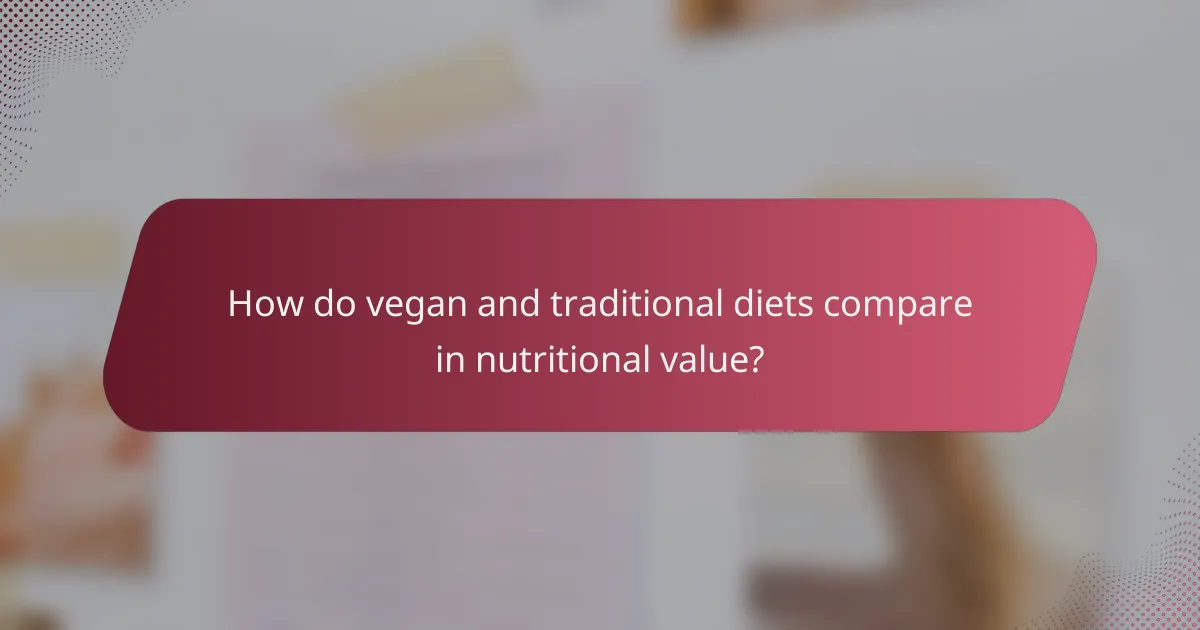
How do vegan and traditional diets compare in nutritional value?
Vegan and traditional diets offer distinct nutritional profiles that can influence health and performance. While both can provide essential nutrients, their sources and compositions vary significantly, impacting overall dietary quality.
Vegan diet nutrients
A vegan diet primarily consists of plant-based foods, which can be rich in vitamins, minerals, and antioxidants. Key nutrients often found in vegan diets include fiber, vitamin C, potassium, and magnesium. However, certain nutrients like vitamin B12, iron, and omega-3 fatty acids may require careful planning or supplementation.
Common sources of these nutrients in a vegan diet include legumes, nuts, seeds, whole grains, fruits, and vegetables. Incorporating a variety of these foods can help ensure a balanced intake of essential nutrients.
Traditional diet nutrients
Traditional diets typically include a mix of animal and plant-based foods, providing a broader range of nutrients. Key nutrients often found in traditional diets include protein, vitamin B12, heme iron, and calcium. These nutrients are readily available from sources such as meat, dairy, and eggs.
In addition to animal products, traditional diets also include fruits, vegetables, and grains, which contribute to overall nutrient diversity. This combination can make it easier to meet daily nutritional requirements without supplementation.
Key differences in vitamins and minerals
One major difference between vegan and traditional diets is the availability of certain vitamins and minerals. For instance, vitamin B12 is primarily found in animal products, making it a concern for those on a vegan diet. In contrast, traditional diets naturally provide this vitamin, reducing the risk of deficiency.
Iron is another nutrient where differences arise; while plant-based iron (non-heme) is less easily absorbed, animal-based iron (heme) is more bioavailable. Vegans can enhance iron absorption by pairing plant sources with vitamin C-rich foods.
Protein sources comparison
Protein sources vary significantly between vegan and traditional diets. Vegan diets rely on plant-based proteins such as legumes, tofu, tempeh, and seitan. While these sources can provide adequate protein, they may lack some essential amino acids unless combined properly.
In contrast, traditional diets include animal proteins like meat, fish, eggs, and dairy, which are complete proteins containing all essential amino acids. This makes it easier for individuals following a traditional diet to meet their protein needs without extensive meal planning.
Fiber content analysis
Vegan diets are generally higher in fiber due to the abundance of fruits, vegetables, whole grains, and legumes. High fiber intake is associated with various health benefits, including improved digestion and reduced risk of chronic diseases.
Traditional diets may contain less fiber, particularly if they include more processed foods and animal products. To increase fiber intake in a traditional diet, individuals can focus on adding whole grains, fruits, and vegetables to their meals.
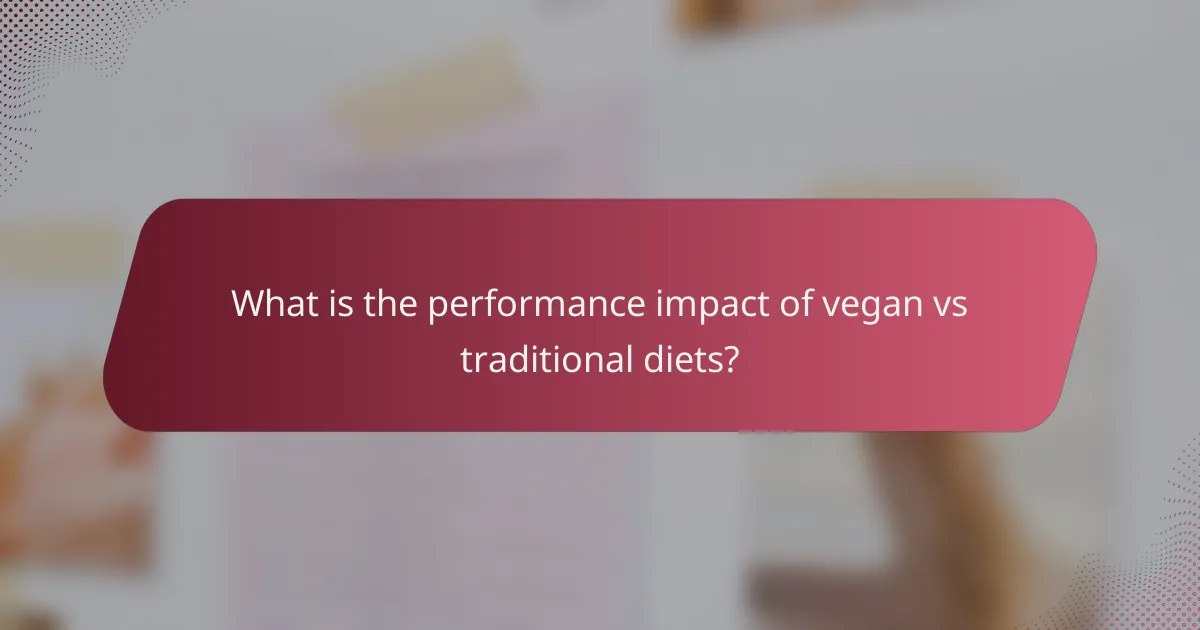
What is the performance impact of vegan vs traditional diets?
The performance impact of vegan and traditional diets can vary significantly based on individual needs and dietary choices. While both diets can support athletic performance, they may influence energy levels, recovery times, and overall physical capabilities differently.
Effects on athletic performance
Athletic performance can be influenced by the nutritional composition of a diet. Vegan diets, rich in carbohydrates and low in saturated fats, can enhance endurance for activities like running or cycling. However, traditional diets that include animal proteins may provide higher levels of certain amino acids essential for muscle repair and growth.
Studies suggest that athletes on a well-planned vegan diet can perform at comparable levels to those on traditional diets, provided they ensure adequate intake of protein, iron, and vitamin B12. Incorporating a variety of plant-based foods can help meet these nutritional needs.
Energy levels in daily activities
Energy levels throughout the day can be affected by the types of foods consumed. Vegan diets that emphasize whole grains, fruits, and vegetables can provide sustained energy due to their high fiber content. Conversely, traditional diets may offer quick energy boosts from animal products, but they can also lead to energy crashes if high in processed foods.
Individuals may find that their energy levels fluctuate based on meal composition. A balanced vegan meal with complex carbohydrates and healthy fats can maintain energy more effectively than a high-sugar traditional meal.
Recovery times after exercise
Recovery times can vary between vegan and traditional diets based on nutrient intake. Vegan diets may require careful planning to ensure sufficient protein and antioxidants, which are crucial for muscle recovery. Foods like lentils, chickpeas, and quinoa can aid in recovery when consumed post-exercise.
On the other hand, traditional diets typically provide easy access to protein sources like meat and dairy, which can facilitate quicker muscle repair. Athletes may need to experiment with both diets to determine which supports their recovery best, considering factors like personal preferences and digestive comfort.
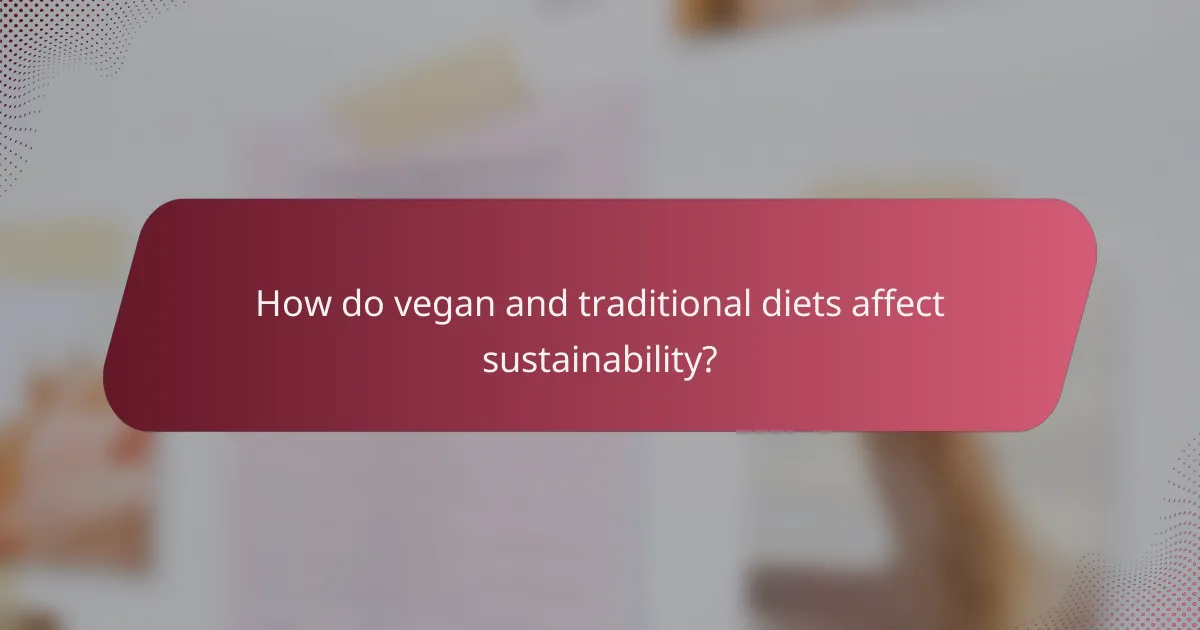
How do vegan and traditional diets affect sustainability?
Vegan diets generally have a lower environmental impact compared to traditional diets, primarily due to reduced resource consumption and greenhouse gas emissions. The choice of diet plays a significant role in sustainability, influencing land use, water consumption, and overall ecological footprints.
Environmental impact of vegan diets
Vegan diets tend to require less land and water than traditional diets, as they eliminate animal agriculture, which is resource-intensive. For instance, producing plant-based foods typically uses fewer resources and generates lower emissions compared to meat and dairy production.
Moreover, a shift towards veganism can lead to significant reductions in greenhouse gas emissions. Studies suggest that adopting a vegan diet can cut individual carbon footprints by a notable percentage, contributing positively to climate change mitigation.
Environmental impact of traditional diets
Traditional diets, particularly those high in meat and dairy, often have a larger environmental footprint. The livestock sector is a major contributor to deforestation, water depletion, and biodiversity loss. For example, raising cattle requires substantial land and water resources, which can strain local ecosystems.
Additionally, traditional diets can lead to higher greenhouse gas emissions, as animal farming is a significant source of methane and nitrous oxide, potent greenhouse gases. This impact varies by region, depending on agricultural practices and local dietary habits.
Carbon footprint comparison
When comparing carbon footprints, vegan diets typically result in lower emissions than traditional diets. Research indicates that plant-based diets can produce up to 50% less carbon dioxide equivalent per meal than those including meat and dairy.
To illustrate, a meal centered around legumes and grains may have a carbon footprint of around 0.5 kg CO2e, while a meat-based meal could exceed 1 kg CO2e. These differences highlight the potential for dietary choices to influence overall sustainability efforts.
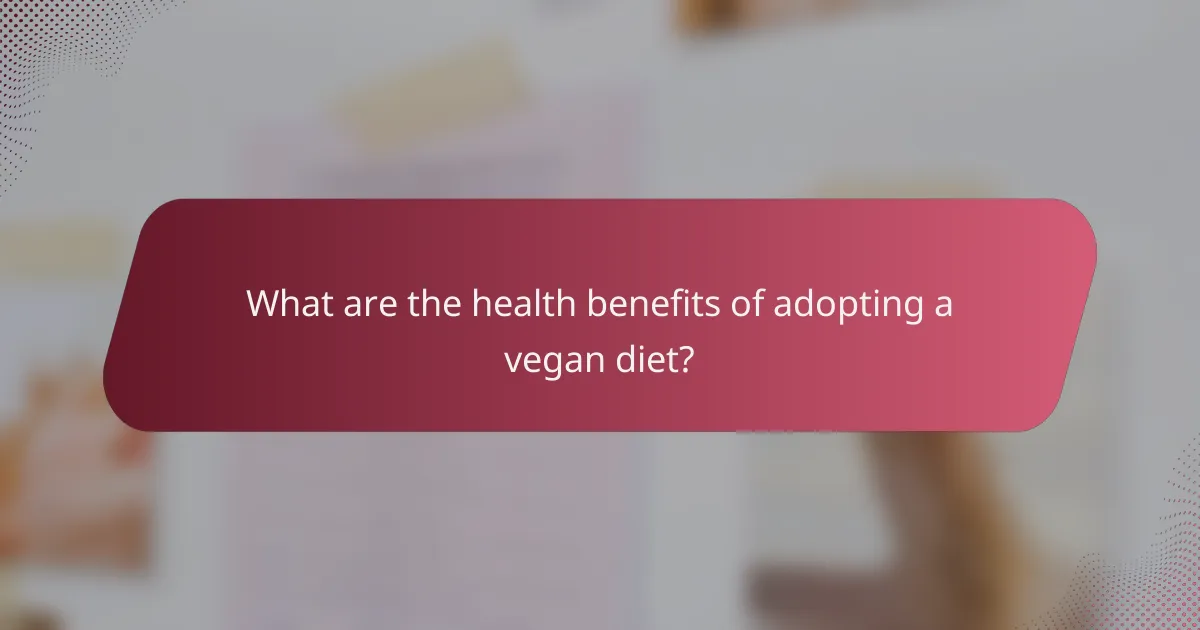
What are the health benefits of adopting a vegan diet?
Adopting a vegan diet can lead to numerous health benefits, including a lower risk of chronic diseases, easier weight management, and improved heart health. These advantages stem from a diet rich in fruits, vegetables, whole grains, and legumes, which provide essential nutrients while minimizing harmful substances found in animal products.
Reduced risk of chronic diseases
A vegan diet is associated with a lower risk of developing chronic diseases such as type 2 diabetes, certain cancers, and hypertension. This is largely due to the high intake of antioxidants, fiber, and phytochemicals found in plant-based foods, which help combat inflammation and oxidative stress.
To maximize these benefits, focus on whole, minimally processed foods. Incorporating a variety of fruits, vegetables, nuts, and seeds can enhance nutrient diversity and provide protective health benefits.
Weight management advantages
Many people find it easier to maintain a healthy weight on a vegan diet due to its naturally lower calorie density. Plant-based foods are often high in fiber, which promotes satiety and helps control hunger, making it simpler to avoid overeating.
For effective weight management, aim to fill your plate with a colorful array of vegetables and whole grains while limiting high-calorie processed foods. Regular meal planning can help ensure you stay on track and meet your nutritional needs.
Heart health improvements
A vegan diet can significantly improve heart health by lowering cholesterol levels and reducing blood pressure. The absence of saturated fats found in animal products, combined with the heart-healthy fats in nuts and seeds, contributes to better cardiovascular outcomes.
To support heart health, include foods rich in omega-3 fatty acids, such as flaxseeds and chia seeds, and limit added sugars and refined carbohydrates. Regular physical activity and routine health check-ups are also essential for maintaining cardiovascular well-being.

What are the challenges of maintaining a vegan diet?
Maintaining a vegan diet can present several challenges, including nutritional deficiencies, social and dining obstacles, and cost considerations. Understanding these issues is essential for anyone considering or currently following a vegan lifestyle.
Nutritional deficiencies
A vegan diet can lead to potential nutritional deficiencies, particularly in vitamin B12, iron, calcium, and omega-3 fatty acids. These nutrients are often found in animal products, making it crucial for vegans to seek alternative sources or supplements.
To mitigate these deficiencies, vegans should incorporate fortified foods, such as plant-based milks and cereals, and consider supplements where necessary. Regular blood tests can help monitor nutrient levels and guide dietary adjustments.
Social and dining challenges
Social situations can pose challenges for those on a vegan diet, as many restaurants and gatherings may not offer suitable options. This can lead to feelings of isolation or pressure to compromise dietary choices.
To navigate these challenges, vegans can communicate their dietary preferences in advance when attending events or suggest restaurants with vegan-friendly menus. Bringing a dish to share can also ensure there is something suitable to eat.
Cost considerations
While a vegan diet can be economical, it may also involve higher costs for specialty products like plant-based meats and dairy alternatives. Prices for organic and non-GMO items can further increase expenses.
To manage costs, vegans can focus on whole foods such as grains, legumes, fruits, and vegetables, which are often more affordable. Planning meals and buying in bulk can also help reduce overall spending.
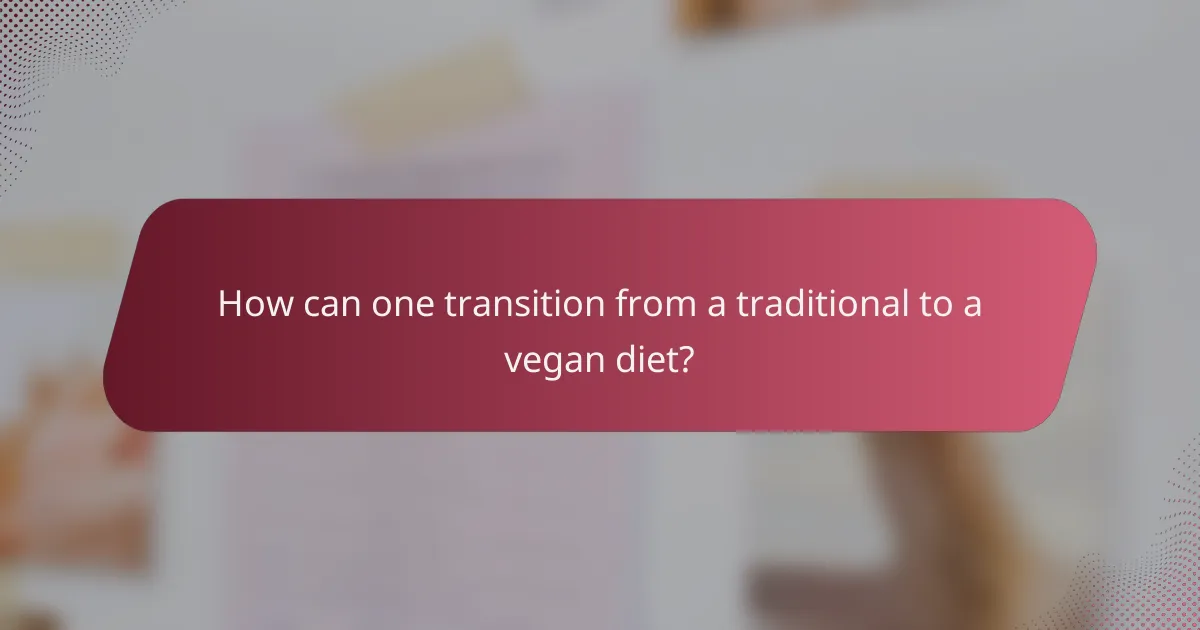
How can one transition from a traditional to a vegan diet?
Transitioning from a traditional to a vegan diet involves gradually eliminating animal products while incorporating plant-based alternatives. This process can enhance nutritional intake and align with personal health or ethical goals.
Step-by-step transition plan
Start by assessing your current diet to identify animal products you consume regularly. Gradually replace these with vegan options, such as swapping dairy milk for almond or oat milk and using plant-based proteins like lentils or tofu instead of meat.
Consider implementing a phased approach, such as dedicating specific days to vegan meals or starting with one meal per day. This can ease the transition and help your palate adjust to new flavors and textures.
Keep a food diary to track your meals and how you feel during the transition. This can help identify any nutritional gaps and ensure you are meeting your dietary needs, particularly for protein, iron, and vitamin B12, which may require careful planning in a vegan diet.
